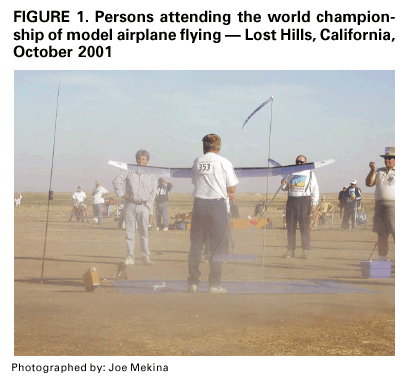 |
|
|
|
|
|
|
| ||||||||||
|
|
|
|
|
|
|
||||
| ||||||||||
|
|
|
|
|
Persons using assistive technology might not be able to fully access information in this file. For assistance, please send e-mail to: mmwrq@cdc.gov. Type 508 Accommodation and the title of the report in the subject line of e-mail. Public Health Dispatch: Coccidioidomycosis Among Persons Attending the World Championship of Model Airplane Flying --- Kern County, California, October 2001On December 4, 2001, CDC was notified by the United Kingdom (UK) Public Health Laboratory Service (PHLS) of a UK resident aged 72 years who had culture-confirmed coccidioidomycosis (i.e., Valley fever) diagnosed in early December. During October 8--12, the patient had attended the world championship of model airplane flying in Lost Hills, California, located in Kern County in the Central Valley of California, an area where coccidioidomycosis is highly endemic (Figure 1). The patient had influenza-like symptoms on approximately October 25, 1 week after returning from Lost Hills. CDC, in collaboration with UK PHLS and the California Department of Health Services, is conducting an investigation. The championship was an international event with competing teams from 30 countries in the Americas, Europe, and the Pacific. Each participating team had up to 11 members. In addition, several spectators may have traveled with each team. Coccidioidomycosis is caused by inhalation of arthrospores of the dimorphic fungus Coccidioides immitis. Outbreaks typically have occurred following dust-generating events such as archaeologic digs (1). Forty percent of newly infected persons acquire a self-limited influenza-like syndrome with fever, chest pain, cough, malaise, chills, night sweats, arthralgias, and rash. Disseminated disease may develop involving the meninges, bones, joints, skin, and soft tissues. Infants, pregnant women, persons of Filipino and African descent, and immunosuppressed persons (e.g., those on chronic steroids or with acquired immunodeficiency syndrome) are at increased risk for disseminated infection. Treatment with antifungal drugs usually is required only for severe or disseminated disease (2). Coccidioidomycosis is diagnosed by culture, histopathology, or serology. Serologic criteria for diagnosis include detection of coccidioidal IgM by immunodiffusion, enzyme immunoassay (EIA), latex agglutination, or tube precipitation, or by detection of rising IgG titers by immunodiffusion, EIA, or complement fixation. Coccidioidomycosis should be considered in the differential diagnosis for persons with a clinically compatible illness and with a history of travel to this event. Persons who attended this event and who acquire symptoms should seek appropriate medical care. Clinical evaluation should include a serum specimen for IgG and IgM titers and appropriate cultures if evidence of disseminated disease exists. Health-care providers or championship participants and spectators from California are encouraged to contact the California Department of Health Services at 619-692-8664 or knm6@cdc.gov to discuss the need for testing. Other participants, spectators, or health-care providers in the United States or abroad may contact CDC's Mycotic Diseases Branch at 404-639-1299 or tnc4@cdc.gov. Reported by: A Nicoll, B Evans, N Asgari, S Hahne, E Johnson, Public Health Laboratory Svc, United Kingdom. BA Jinadu, R Talbot, Kern County Dept of Health, Bakersfield; SB Werner, D Vugia, California Dept of Health Svcs. Mycotic Diseases Br, Div of Bacterial and Mycotic Diseases, National Center for Infectious Diseases; and EIS officers, CDC. References
Figure 1  Return to top.
Disclaimer All MMWR HTML versions of articles are electronic conversions from ASCII text into HTML. This conversion may have resulted in character translation or format errors in the HTML version. Users should not rely on this HTML document, but are referred to the electronic PDF version and/or the original MMWR paper copy for the official text, figures, and tables. An original paper copy of this issue can be obtained from the Superintendent of Documents, U.S. Government Printing Office (GPO), Washington, DC 20402-9371; telephone: (202) 512-1800. Contact GPO for current prices. **Questions or messages regarding errors in formatting should be addressed to mmwrq@cdc.gov.Page converted: 12/13/2001 |
|||||||||
This page last reviewed 12/13/2001
|